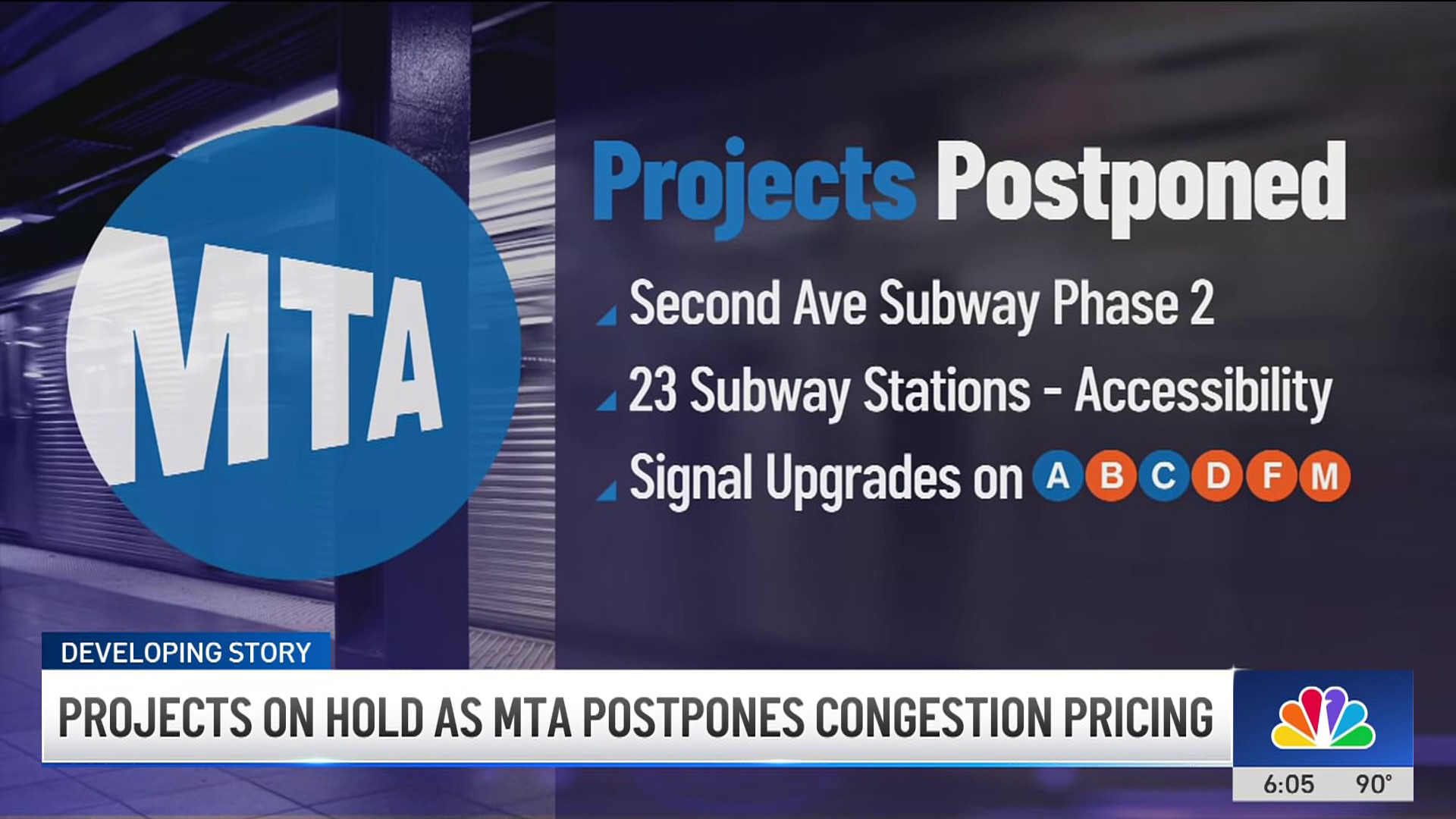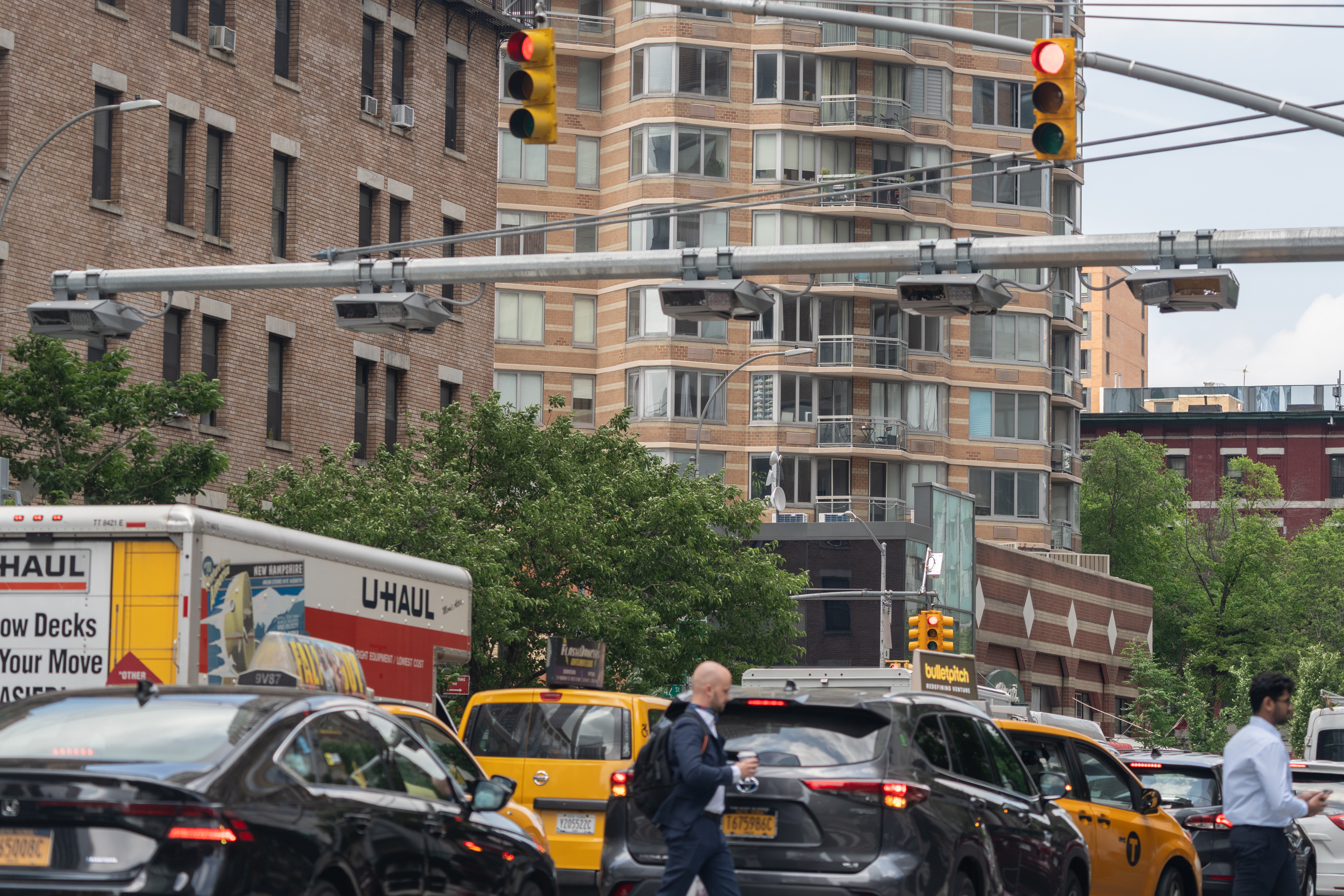What to Know
- New York's public transit system will stop work on a planned subway line expansion and retreat from other maintenance and improvement projects because of a $16.5 billion shortfall caused by Gov. Kathy Hochul's decision to halt a plan to fund the projects through “congestion” tolls imposed on Manhattan drivers.
- The Metropolitan Transportation Authority board took a formal vote Wednesday to delay the tolling program. It had been on track to launch June 30 before Hochul's surprise announcement of an unspecified “pause” in implementing the program.
- It would have charged most private cars about $15 to enter the busiest part of Manhattan, on top of any other bridge or tunnel tolls. Hochul said she was delaying the congestion tolls because of concerns that New York City's economy might be hurt if people stayed away from the city to avoid them.
New York's public transit system will stop work on a planned subway line expansion and retreat from other maintenance and improvement projects because of a $16.5 billion shortfall caused by Gov. Kathy Hochul's decision to halt a plan to fund the projects through “congestion” tolls imposed on Manhattan drivers.
The Metropolitan Transportation Authority board took a formal vote Wednesday to delay the tolling program. It had been on track to launch June 30 before Hochul's surprise announcement of an unspecified “pause” in implementing the program.
It would have charged most private cars about $15 to enter the busiest part of Manhattan, on top of any other bridge or tunnel tolls. Hochul said she was delaying the congestion tolls because of concerns that New York City's economy might be hurt if people stayed away from the city to avoid them.
Hochul has promised to fill the funding gap caused by the indefinite suspension of the program but hasn't presented a specific plan.
In the meeting, MTA board members stressed that they had no power to reverse Hochul’s decision. The state law establishing congestion pricing requires a sign-off from her transportation department, they said.
Get Tri-state area news delivered to your inbox.> Sign up for NBC New York's News Headlines newsletter.
“There is no path for the MTA to proceed,” said Daniel Garodnick, one of the board members who voted yes on the resolution while lamenting the Democratic governor's decision.
Until money is found to replace the anticipated toll revenue, the MTA will need to slash its capital budget by at least 30%, the authority's officials said in a presentation to board members. The estimates factor in lost revenue, sunk costs, and potentially lost federal funding.
At the meeting, MTA leaders presented a plan to reprioritize building projects assuming a massive shortfall, focusing on maintaining current service. It included halting $5 billion in spending on a planned subway expansion and a $7.5 billion retreat from improving existing services with trains, track improvements, and maintenance. The budget now cuts some $2 billion from plans to make more stations wheelchair-accessible.
Some $500 million in planned purchases of zero-emission buses will be delayed, an effort that was aimed at reducing pollution, which is tied to respiratory problems.
“To me that presentation is dire. No board member wants to sit here talking about what projects we want to cut," said board member Midori Valdivia. “It feels really tragic that we might not be able to deliver to our environmental justice communities as much as we had promised."
In a statement, Hochul said she still had “unwavering support for the MTA” and pledged to work with its leaders and the Legislature to find ways to pay for planned projects.
“While the timing of the next budget may necessitate temporary adjustments to the timeline of certain contracts, there is no reason for New Yorkers to be concerned that any planned projects will not be delivered,” she said.
“I also believe that there are additional opportunities for savings and improved revenues within existing MTA operations,” she added.
Hochul previously suggested a tax increase on New York businesses as a way to raise money, but that idea died in the Legislature.
Board members said they were bombarded with emails asking them to defy the governor's decision to halt the tolling program, which had the dual goal of funding the subways while reducing vehicle traffic on Manhattan's most congested streets.
“We don’t engage in theatrics,” MTA Chair and CEO Janno Lieber said, when a reporter asked about possible symbolic actions the board could have taken in protest.
The dent in the MTA’s budget could deepen depending on how long funding is delayed. The MTA already inked contracts for $500 million to pay for cameras and other infrastructure for the congestion pricing system. It will be charged by contractors for scaling back or rescinding awards, with the problems compounding as the uncertainty continues.
“Time wounds all projects," Lieber said, declining to outline when the funding hole will be fully seen. "It’s not a bright line.”
The MTA also can't collect $3 billion in federal match money for building projects without money from the state, MTA officials said, though there's no clear deadline for losing the money. Under the austerity plan, $2 billion in matching funds from the state now needs to be redirected to keeping the trains running.
Lieber said the board may have to vote later to authorize specific cuts.



